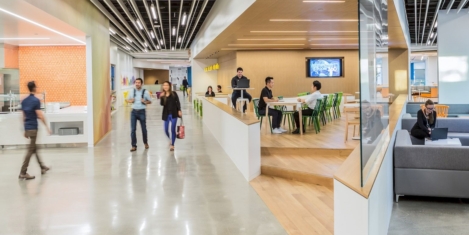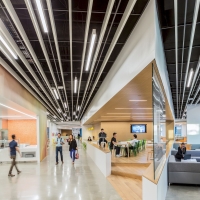To provide the best experiences, we use technologies like cookies to store and/or access device information. Consenting to these technologies will allow us to process data such as browsing behaviour or unique IDs on this site. Not consenting or withdrawing consent, may adversely affect certain features and functions.
The technical storage or access is strictly necessary for the legitimate purpose of enabling the use of a specific service explicitly requested by the subscriber or user, or for the sole purpose of carrying out the transmission of a communication over an electronic communications network.
The technical storage or access is necessary for the legitimate purpose of storing preferences that are not requested by the subscriber or user.
The technical storage or access that is used exclusively for statistical purposes.
The technical storage or access that is used exclusively for anonymous statistical purposes. Without a subpoena, voluntary compliance on the part of your Internet Service Provider, or additional records from a third party, information stored or retrieved for this purpose alone cannot usually be used to identify you.
The technical storage or access is required to create user profiles to send advertising, or to track the user on a website or across several websites for similar marketing purposes.
 New research from Fellowes Brands claims to reveal the ‘alarming’ impact enforced remote work is having on the mental wellbeing and physical health of the nation. Over a third (35 percent) of UK workers admit feeling stressed or anxious, lonely and isolated (32 percent) and tired or lacking in energy (38 percent), while working from home during lockdown. The study is based on a survey of 1,000 UK office workers who had worked from home for at least four months. (more…)
New research from Fellowes Brands claims to reveal the ‘alarming’ impact enforced remote work is having on the mental wellbeing and physical health of the nation. Over a third (35 percent) of UK workers admit feeling stressed or anxious, lonely and isolated (32 percent) and tired or lacking in energy (38 percent), while working from home during lockdown. The study is based on a survey of 1,000 UK office workers who had worked from home for at least four months. (more…)







 According to a recent
According to a recent 
 The COVID-19 pandemic left businesses in an unprecedented position of having to rapidly adapt workplace practices and implement new processes at a moment’s notice. Of course, those companies that were already accustomed to home office set-ups and flexible hours were in a much better place to adapt to these changing circumstances. However, not all businesses were prepared for the sudden change to work routines.
The COVID-19 pandemic left businesses in an unprecedented position of having to rapidly adapt workplace practices and implement new processes at a moment’s notice. Of course, those companies that were already accustomed to home office set-ups and flexible hours were in a much better place to adapt to these changing circumstances. However, not all businesses were prepared for the sudden change to work routines. 


 Workspace Show is an exciting addition to the global design events calendar, launching on 21 January this year, with the inaugural edition taking place from 4-5 November 2021 at London’s Business Design Centre, at the heart of the UK’s commercial interiors community. With a theme of ‘re-designing tomorrow’s commercial interiors together’ the show aims to unite architects, designers, developers, contractors, facilities managers, procurement managers and more in one place to explore and share the latest industry thinking from product launches to a comprehensive talks program to networking opportunities aplenty.
Workspace Show is an exciting addition to the global design events calendar, launching on 21 January this year, with the inaugural edition taking place from 4-5 November 2021 at London’s Business Design Centre, at the heart of the UK’s commercial interiors community. With a theme of ‘re-designing tomorrow’s commercial interiors together’ the show aims to unite architects, designers, developers, contractors, facilities managers, procurement managers and more in one place to explore and share the latest industry thinking from product launches to a comprehensive talks program to networking opportunities aplenty. 
 It was in the summer of 2020 that conversations about a second pandemic of mental health issues first started. As we began to see and feel our mental health suffering due to the ongoing impact of COVID19, this idea gained momentum and interest within business sectors. This concept has also been leapt upon by health and wellbeing consultants everywhere as they whip up a storm discussing the inevitable wave of mental health issues threatening to engulf our employees in the future.
It was in the summer of 2020 that conversations about a second pandemic of mental health issues first started. As we began to see and feel our mental health suffering due to the ongoing impact of COVID19, this idea gained momentum and interest within business sectors. This concept has also been leapt upon by health and wellbeing consultants everywhere as they whip up a storm discussing the inevitable wave of mental health issues threatening to engulf our employees in the future. 
 The idea of a Global Village comes loaded with a number of idyllic connotations. Most of them derive from the use of the word village itself, which triggers the idea of a community in our minds. Yet even the man who coined and popularised the term in the 1950s and 60s to describe a world contracted by new media understood that there are always complications whenever technology rubs up against human beings.
The idea of a Global Village comes loaded with a number of idyllic connotations. Most of them derive from the use of the word village itself, which triggers the idea of a community in our minds. Yet even the man who coined and popularised the term in the 1950s and 60s to describe a world contracted by new media understood that there are always complications whenever technology rubs up against human beings. 
 BlackRock is one of the largest asset management companies on the planet. Each year, at the start of January, the CEO Larry Fink writes a letter addressed to the other CEOs of the world. In his New Year’s letter for 2020, Fink appealed in particular to his fellow CEOs’ sense of social responsibility. In particular, he focused in on the risks faced by the climate. “Climate risk is an investment risk,” and he called on all companies, both public and private, to create greater societal added value. “Society is looking increasingly to companies to solve social and economic problems,” he concludes, so asset managers should be encouraged to invest in companies with a ‘purpose’.
BlackRock is one of the largest asset management companies on the planet. Each year, at the start of January, the CEO Larry Fink writes a letter addressed to the other CEOs of the world. In his New Year’s letter for 2020, Fink appealed in particular to his fellow CEOs’ sense of social responsibility. In particular, he focused in on the risks faced by the climate. “Climate risk is an investment risk,” and he called on all companies, both public and private, to create greater societal added value. “Society is looking increasingly to companies to solve social and economic problems,” he concludes, so asset managers should be encouraged to invest in companies with a ‘purpose’. 
 With the continuous impact of the pandemic on people’s mental health due to isolation, work uncertainty, and anxiety over health, the topic has been dominating the news, begging the question of how we can achieve accessible and cost-effective treatment for all and prevent the expected acceleration of mental health issues in the coming months. As we juggle a different type of work-life balance brought about by working from home and the added worry of how the pandemic is affecting us, there is no doubt that our daily lives have been disrupted. The statistics are alarming;
With the continuous impact of the pandemic on people’s mental health due to isolation, work uncertainty, and anxiety over health, the topic has been dominating the news, begging the question of how we can achieve accessible and cost-effective treatment for all and prevent the expected acceleration of mental health issues in the coming months. As we juggle a different type of work-life balance brought about by working from home and the added worry of how the pandemic is affecting us, there is no doubt that our daily lives have been disrupted. The statistics are alarming; 
 The World Economic Forum has launched a new report which sets out to define how organisational leaders can influence their companies and encourage the responsible use of technology and build ethical capacity.
The World Economic Forum has launched a new report which sets out to define how organisational leaders can influence their companies and encourage the responsible use of technology and build ethical capacity. 
 When we think about inclusivity and diversity in the corporate world, we often think of racial and cultural diversity, gender, or LGBTQ+ inclusion—but one aspect that has been too long forgotten or ignored is the topic of disability inclusion. Caroline Casey, disability activist, CEO and founder of the
When we think about inclusivity and diversity in the corporate world, we often think of racial and cultural diversity, gender, or LGBTQ+ inclusion—but one aspect that has been too long forgotten or ignored is the topic of disability inclusion. Caroline Casey, disability activist, CEO and founder of the 








January 21, 2021
Hybrid working gives managers the chance to excel
by Paul Jewitt-Harris • Comment, Flexible working